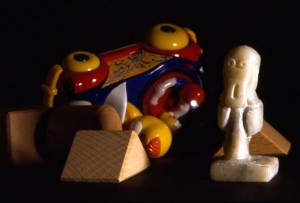I’m in one of THOSE moods today, which means I’m probably in a culture shock down swing.
One of the things that hurts me with both languages and sport is that I’m prone to periodic bouts of brain lock. I can practice the basic set plays in basketball and memorize subjunctives and modals and various tenses described as “perfect” but when the actual play starts, and things are moving much faster and more chaotically than in practice, my brain just sort of stops and says “Okay, so now what?” More often than not I’m left standing in one part of the court just sort of blathering to myself. (This, by colossal coincidence, is a pretty apt description of my dating techniques as well.)
It is, I suspect, a form of panic. Rather than living in the moment and reacting to what actually is going on, my brain searches out the perfect thing to do and, not finding it, just takes a little vacation, but I usually pull myself together and move on (albeit, from the far end of the bench whilst I’m holding the stats clipboard trying to keep track of shots and rebounds).
That said, there have only been a few times in my life where I felt completely helpless as a result of brain lock. In one case, it was a the result of ignoring a series of signs, and my own nature, and hoping for the best (which is also a symptom of brain lock).
Back when I was working in Nou-machi, as a rule, I tried to avoid teacher trips. They typically took place in the summer and the staff of the school bussed off to some resort town and had a drunken good time whilst the parents were, for a short time anyway, actually in charge of their children.
I was usually invited to join the trips, but the people issuing the invitations were clearly only doing so out of courtesy. There were a lot reasons for this, part of it having to do with me being a foreigner, and part of it having to do with me working for the school board and not for the school (long, long story that).
One summer, though, in a fit of brain lock, I thought “Well, why not? What’s the worst that can happen?” and said yes. The English teachers I worked with, Miss Kato and The Beautiful Miss Takahashi (not her real name–for the record, that is the phrase She Who Must Be Obeyed used to describe her) talked up the trip, which was to a famous lake and ski resort in Fukushima Prefecture. They talked about all the stuff they were planning to do.
Then, at a PTA party, or some such random drinking event, I said I was looking forward to hanging out with all the other teachers and with Miss Kato and the Beautiful Miss Takahashi. They both gave me that look (which is apparently universal to all women all over the world) and explained that “hanging out” was pretty much not going to happen as it was not an English department trip. (Cue ice cold wind sounds, shrieking and horror music theme.)
At this point, the part of my brain that actually, on occasion functions, took the hint (DON’T GO! GET YOUR MONEY BACK! HELL, LET THEM KEEP THE MONEY! DON’T GO!) I also seem to remember complaining about that incident to my friend Charles who said something like “You know, whenever I start to feel like a part of the team, something always happens to remind me that I’m not.” In retrospect, this was his way of saying DON’T GO! GET YOUR MONEY BACK! HELL, LET THEM KEEP THE MONEY! DON’T GO!
I, of course, went on the trip because the large part of my brain that was locked up thought things would work out.
Long story short: things didn’t work out. We had an expensive, microscopic lunch and rain cancelled the one set of activities everyone was most looking forward to. Therefore, everyone was in a bad mood when we somehow ended up at a glass factory/museum. No one bothered to tell me how long we’d be there or that most of the teaching staff were going to a nearby bar. At that point, I was in the middle of the basketball court two movements behind in the set play, out of position and pretty much already blathering.
What I remember most about this incident was the feeling of panic and not knowing what to do. I was stuck for two days with people who clearly didn’t want me around and weren’t bothering to keep me informed. After a while I want back to the bus for a short nap. To make matters even more interesting, they’d stuck me off in a room by myself which is something that never, ever happens on a Japanese trip because the group is too important to them.
However, it did give me some time alone to recharge and settle down and get my brain working again (well, so to speak). A long soak in the hot spring bath helped a lot, too (almost as good a form of therapy as a proper haircut).
I ended up having a good time drinking with the principal and vice principal and didn’t have to pay for any of the beer, whiskey or sake.
Since then, I’ve managed to avoid school trips, although I did stumble across someone else’s once on a trip to Kyoto. (But that’s another odd story.)


